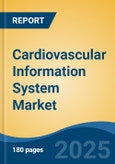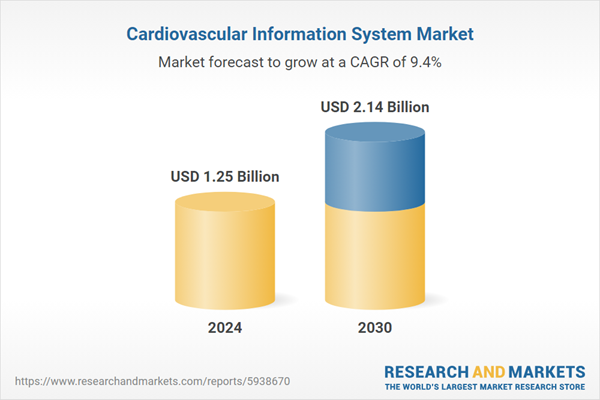Speak directly to the analyst to clarify any post sales queries you may have.
10% Free customizationThis report comes with 10% free customization, enabling you to add data that meets your specific business needs.
Key Market Drivers
Rising Cardiovascular Disease Burden
Cardiovascular diseases, including heart conditions and vascular ailments, continue to cast a long shadow on global public health. These conditions are the leading cause of mortality worldwide, posing a significant burden on healthcare systems, economies, and, most importantly, the lives of countless individuals. In the face of this growing cardiovascular disease burden, the Global Cardiovascular Information System (CVIS) market is experiencing a substantial boost.Cardiovascular diseases are a global health epidemic, affecting people across all continents and income groups. These conditions encompass a wide range of disorders, including coronary artery disease, heart failure, stroke, and peripheral vascular disease. The World Health Organization (WHO) cardiovascular diseases representing 32% of all global deaths. The escalating prevalence of these diseases is the primary driver behind the growing demand for CVIS solutions. As populations age, adopt sedentary lifestyles, and experience an increase in risk factors such as hypertension and diabetes, the number of cardiovascular patients is on the rise. Consequently, healthcare systems worldwide are searching for innovative tools and technologies to manage this influx efficiently.
According to WHO, Cardiovascular diseases (CVDs) are the leading cause of death globally, taking an estimated 17.9 million lives each year. CVDs are a group of disorders of the heart and blood vessels and include coronary heart disease, cerebrovascular disease, rheumatic heart disease and other conditions. More than four out of five CVD deaths are due to heart attacks and strokes, and one third of these deaths occur prematurely in people under 70 years of age.
Key Market Challenges
Interoperability Issues
Interoperability is a significant challenge within the healthcare industry. CVIS systems need to seamlessly integrate with various healthcare IT systems, including electronic health records (EHRs), diagnostic imaging systems, and telemedicine platforms. Achieving seamless data exchange between different systems and vendors can be complex, requiring the use of standardized protocols and robust data sharing solutions.Key Market Trends
Cloud-Based CVIS Solutions
Cloud-based CVIS solutions are gaining traction due to their scalability, flexibility, and cost-effectiveness. Storing cardiovascular patient data and diagnostic images in the cloud allows for easy access from multiple locations, enhancing collaborative care and remote consultations. It also minimizes the need for extensive on-site hardware infrastructure, reducing the financial burden on healthcare institutions.Key Market Players
- Koninklijke Philips N.V.
- GE HealthCare
- Cisco Systems Inc
- FUJIFILM Medical Systems USA Inc
- Siemens Healthcare GmbH
- Cerner Corp
- Lumedx Corp
- Digisonics Inc
- Honeywell International Inc
- McKesson Corporation
Report Scope:
In this report, the Global Cardiovascular Information System Market has been segmented into the following categories, in addition to the industry trends which have also been detailed below:Cardiovascular Information System Market, By Mode of Operation:
- Web based
- Cloud based
- On site
Cardiovascular Information System Market, By System:
- CVIS
- CPACS
Cardiovascular Information System Market, By Region:
- North America
- United States
- Canada
- Mexico
- Europe
- Germany
- United Kingdom
- France
- Italy
- Spain
- Asia-Pacific
- China
- Japan
- India
- Australia
- South Korea
- South America
- Brazil
- Argentina
- Colombia
- Middle East & Africa
- South Africa
- Saudi Arabia
- UAE
- Kuwait
Competitive Landscape
Company Profiles: Detailed analysis of the major companies present in the Global Cardiovascular Information System Market.Available Customizations:
With the given market data, the publisher offers customizations according to a company's specific needs. The following customization options are available for the report.Company Information
- Detailed analysis and profiling of additional market players (up to five).
This product will be delivered within 1-3 business days.
Table of Contents
Companies Mentioned
- Koninklijke Philips N.V.
- GE HealthCare
- Cisco Systems Inc
- FUJIFILM Medical Systems USA Inc
- Siemens Healthcare GmbH
- Cerner Corp
- Lumedx Corp
- Digisonics Inc
- Honeywell International Inc
- McKesson Corporation
Table Information
| Report Attribute | Details |
|---|---|
| No. of Pages | 180 |
| Published | March 2025 |
| Forecast Period | 2024 - 2030 |
| Estimated Market Value ( USD | $ 1.25 Billion |
| Forecasted Market Value ( USD | $ 2.14 Billion |
| Compound Annual Growth Rate | 9.3% |
| Regions Covered | Global |
| No. of Companies Mentioned | 10 |









